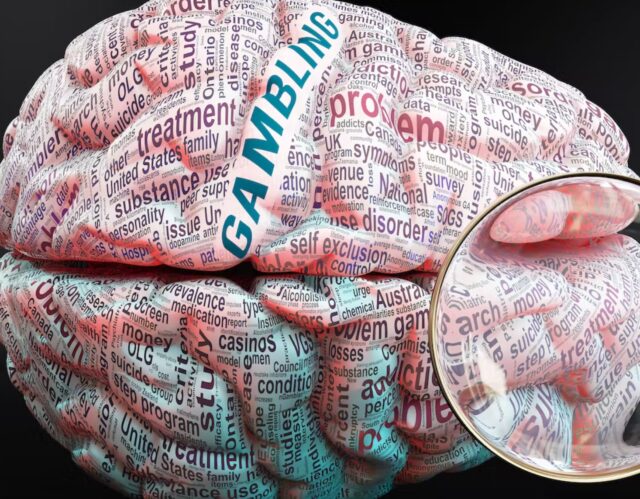
You might not realize it but gambling can have a major effect on your metabolism. From elevated heart rates to increased dopamine levels, understanding the science of gambling can help you take control of your well-being and lifestyle.
Let’s explore how gambling could be impacting you and how you can keep it under control.

The Role of Stress in Gambling
When it comes to the science of gambling and how it affects your metabolism, understanding the role of stress is essential. Gambling elicits an emotional response that involves both the body and the mind, with certain hormones being triggered when experiencing either anxiety or excitement. Such triggers create a feeling of stress that can have a powerful impact on your metabolic rate. Online gambling, like the ones found at leroijohnny.net/fr, may also produce similar emotional responses and trigger the same hormones, which can affect your metabolism in similar ways as traditional gambling.
Stress hormones such as cortisol form part of what is known as “the fight-or-flight response.” This prepares the body for sudden physical exertion, causing an increase in metabolism in order to supply energy faster while suppressing digestion, immune response and other non-essential functions. This can lead to fatigue and irritability, but also to improved concentration and alertness throughout bouts of gambling.
Understanding how gambling triggers this physiological process is key to managing your emotional responses when you enter a casino setting. Only by learning more about its effects on your metabolic rate can you enjoy responsible gaming sessions without becoming overwhelmed by anxiety or other stressful responses that come with a high stakes game.

The Physiological Effects of Gambling
It can have a variety of psychological and physiological effects on an individual. When people gamble, their bodies experience naturally occurring processes such as the release of dopamine, adrenaline and endorphins. As these processes are experienced, they can produce both physical and mental changes in the body.
On a physiological level, your metabolism increases while gambling. As your metabolism speeds up, you burn more calories and your heart rate rises. You may also experience increased perspiration or palms that become clammy due to the increased sympathetic nervous system activity associated with this activity. This heightened state of awareness is designed to focus all of the body’s energy on protecting you from any potential dangers associated with the risky situation.
The release of endorphins found when gambling creates a feeling of pleasure similar to those felt after doing aerobic exercise or extreme sports. This can lead to compulsive behavior and addiction if unchecked as it triggers further releases of endorphins that increase both tolerance for stressors and sensation seeking behaviors related to gambling. Continuous indulgence in this activity could create more serious problems such as post-traumatic stress disorder (PTSD) or a “gambling trance” where an individual loses track of time because they are so focused on playing their game that they forget everything else around them including potential risks involved with their risky behavior.

The Impact of Diet and Exercise on Gambling
In addition to its effects on an individual’s emotions and behavior, gambling has a direct effect on the body. Gambling can increase anxiety and depression, leading to physical problems like insomnia, headaches and acid reflux. Studies have also demonstrated a link between gambling and obesity due to poor diet and lack of physical activity.
It’s important to recognize that while lifestyle factors like poor diet and lack of exercise can put you at risk for compulsive gambling, they are less likely to do so when combined with other healthy practices. Eating well-balanced meals full of nutritious ingredients, such as fruits, vegetables, whole grains, lean proteins and healthy fats will give the body adequate energy for success in the gaming environment. This not only increases your chances of making sound decisions but also boosts your metabolism which aids in better performing decisions when gaming.
The importance of regular exercise cannot be overstated when trying to maintain optimal physical health as it helps reduce stress levels associated with gambling as well as achieves a balanced mind-body connection. Physical activity has been proven to reduce anxiety related symptoms such as muscle tension and negative mood swings. Moderate amounts of exercise have also been linked with increased cognitive abilities which can help the gambler make logical decisions while on the betting table or slots machine. Getting regular exercise not only keeps us active mentally but also physically fit by increasing our energy levels which allows us more time playing our favorite games without feeling too drained or deflated.

The Role of Cognitive Function in Gambling
The role that cognitive function plays in gambling can affect how our bodies respond to certain stimuli. Our brain’s control center for decision making and logical reasoning helps us to make informed and calculated decisions during betting activities. Research has shown that gamblers with higher cognitive functioning abilities tend to stay in the game longer and often commit more money than other players.
Cognitive processes such as learning, memory, focus, logic, and problem-solving are linked to the metabolic effects of gambling. They help us construct strategies for decision making, strategizing risks associated with the game, understanding probabilities of certain outcomes, appreciating the nuances of evaluating odds between competing parties, reading opponents’ cues or behavior and assessing choices when faced with multiple options.
When these processes are performed at a quickened pace (during high stakes games) they put much strain on our metabolic rate which greatly affects our heart rate, blood pressure and breathing rate. High stake betting sessions can naturally cause an increase in cortisol levels which release fight or flight responses that vividly alter the way we perceive ourselves within this risky environment. Not only can it cause anxiety but also generates physical arousal that is stimulated by adrenaline produced by the hypothalamus gland.
Conclusion
Ultimately, more in-depth research is essential to fully understand how gambling affects your metabolic rate and thus leads to an increased risk for problematic health outcomes. It becomes all the more important to recognize signs that could indicate an abnormal relationship with gambling so proper interventions can be implemented early on before more serious issues develop.









